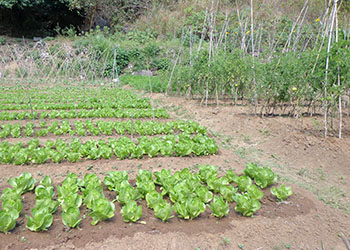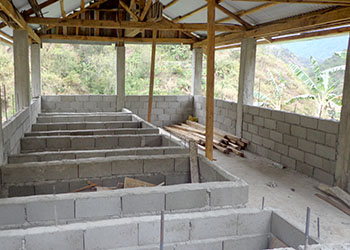Story and Photos by Jun Dom-oguen | Program Officer | Heifer Northern Philippines
 A Farmer Field School (FFS) conducted in the Northern Philippines enhances the skills and capacities of Heifer project families, thanks to an agreement between Heifer Philippines and the Agricultural Training Institute (ATI) under the Department of Agriculture (DA).
A Farmer Field School (FFS) conducted in the Northern Philippines enhances the skills and capacities of Heifer project families, thanks to an agreement between Heifer Philippines and the Agricultural Training Institute (ATI) under the Department of Agriculture (DA).
Under the Memorandum of Agreement, the ATI agreed to provide modules, resource persons and other necessary support for the school, which started in September 2012 in Supang, Sabangan, Mt. Province. Twenty-three families from the Integrating Gift-Giving and Organizing for Overall Community Transformation Attainment (IGOROTA) project, implemented by Igorota Foundation and Heifer Philippines, are enrolled. The DA supports the government mandate to promote organic farming under the Organic Law of the Philippines of 2010. With this in mind, the FFS aims to train partner families in the production of organic vegetables to improve family health and to eventually register their group as organic vegetable producers.
Facilitators of the FFS classes are Mary Buanzi, provincial FFS coordinator; Evelyn Dalog, municipal agriculturist of Sabangan; and Marifee Lucaney, community facilitator. Recognizing the need for a permanent composting site, Lucaney made a proposal to the Department of Agriculture-Cordillera Administrative Region (DA-CAR), which was immediately approved for implementation. The grant was worth about $6,250.
 FFS participants volunteered to build an organic fertilizer processing building, which was completed in December 2012. “The construction delayed the FFS classes, but now we are assured that organic fertilizer is readily available, as it is very important in organic vegetable production," Lucaney said. "The building will be owned and managed by the FFS participants, while proceeds from the sales of organic fertilizer will be an additional income source. The willingness of the FFS enrollees is encouraging; they are aware that, in the future, they will reap the benefits of this new knowledge. We are also happy that the Barangay LGU (Local Government Unit) supports us all the way.”
FFS participants volunteered to build an organic fertilizer processing building, which was completed in December 2012. “The construction delayed the FFS classes, but now we are assured that organic fertilizer is readily available, as it is very important in organic vegetable production," Lucaney said. "The building will be owned and managed by the FFS participants, while proceeds from the sales of organic fertilizer will be an additional income source. The willingness of the FFS enrollees is encouraging; they are aware that, in the future, they will reap the benefits of this new knowledge. We are also happy that the Barangay LGU (Local Government Unit) supports us all the way.”
The crops planted at the FFS include carrots, tomatoes, lettuce and beans. Participants are replicating what they learn from the FFS in their own kitchen gardens. Following the FFS, their plots will be evaluated by the organic coordinator of the Regional Office of Agriculture and the Organic Certifying Agency for Accreditation to certify them as organic producers. They will then be given greenhouse materials by the regional office and will be able to market their organic vegetables at a guaranteed price of 70.00 pesos, or about $1.75, per kilogram (2.2 pounds).
One participant, Gregoria Lacwasan, said, “The Heifer project is like a light at the end of the tunnel. Our community is very poor and most of us already welcomed the idea that poverty is a way of life. When the project came, everything changed; not only our attitude, but also our view about life. We are proud to say that all of us are successful pig raisers and if we continue to practice the Cornerstones (Heifer’s 12 Cornerstones for Just and Sustainable Development), I am very sure we will also become successful producers of organic vegetables. We are very happy because we are slowly achieving our values-based plan.”